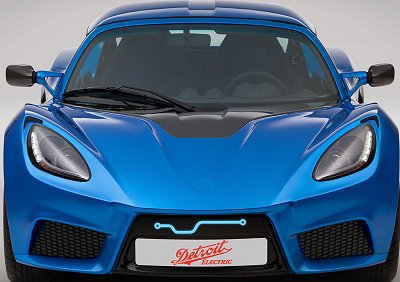
<b>US ELECTRIC BRAND RIVIVAL:</b> Despite taking obvious design cues from the Lotus Elise, the SP:01 is a great looking electric ride and will head into production later in 2013.
DETROIT, Michigan - Detroit Electric, a start-up electric-car maker reviving a brand that dates back more than a century, has unveiled its first model - R1.2-million battery-powered sports car.
With a projected top speed of 250km/h, the Detroit Electric SP:01 is being touted as "the world's fastest pure-electric sports car". The two-seater has a range of "just under 305km" between charges, reports the automaker.
Image gallery
Detroit Electric, founded more than five years ago, is entering a still-nascent market that's struggling to find buyers. One of its would-be rivals, Fisker Automotive, a hybrid-electric sports-car company, has hired a law firm to advise on a possible bankruptcy filing.
'NEW FAMILY OF ELECTRIC CARS'
The car will be built at a plant in Detroit with the automaker planning a limited run of only 999 SP:01 units. According to the automaker, the model will be followed by "a new family of all-electric production cars, including two other high-performance models that will enter production by the end of 2014".
The SP:01 appears to borrow heavily from the British-built Lotus Elise - no surprise, considering a number of Detroit Electric executives once worked for various affiliates of Lotus.
Versions of the Elise have been used by other low-volume automakers, notably Tesla Motors, which based its R1-million Roadster electric car on the Lotus' chassis.
Detroit Electric said the SP:01 was being introduced "following a five-year development and road-test programme".
13 000 ELECTRIC RIDES FROM 1907
The company built 13 000 electric cars between 1907 and 1939, the year it closed down. Production of the electric car, powered by a rechargeable lead-acid battery, began in 1907. The cars were advertised as reaching 130km on a single charge. During a test, an Detroit Electric ran 340km on a charge.
True that the car could only 32km/h but this was considered adequate for driving within city or town limits at the time.
The Detroit Electric was mainly sold to female drivers and doctors who chose the immediate start of the battery over the physically demanding hand-cranked engine required by early combustion engines.
The brand was revived in 2007 as a joint venture between China's Youngman Automotive Group, which tried unsuccessfully to acquire bankrupt Swedish automaker Saab in 2012, and a small California-based electric-car company called Zap.
The venture hired Lotus Engineering in 2007 to provide contract design and technical services. In late 2007 Albert Lam, then chief executive of Lotus Engineering, joined the venture as chairman and was named CEO of Detroit Electric in 2008.
With a projected top speed of 250km/h, the Detroit Electric SP:01 is being touted as "the world's fastest pure-electric sports car". The two-seater has a range of "just under 305km" between charges, reports the automaker.
Image gallery
Detroit Electric, founded more than five years ago, is entering a still-nascent market that's struggling to find buyers. One of its would-be rivals, Fisker Automotive, a hybrid-electric sports-car company, has hired a law firm to advise on a possible bankruptcy filing.
'NEW FAMILY OF ELECTRIC CARS'
The car will be built at a plant in Detroit with the automaker planning a limited run of only 999 SP:01 units. According to the automaker, the model will be followed by "a new family of all-electric production cars, including two other high-performance models that will enter production by the end of 2014".
The SP:01 appears to borrow heavily from the British-built Lotus Elise - no surprise, considering a number of Detroit Electric executives once worked for various affiliates of Lotus.
Versions of the Elise have been used by other low-volume automakers, notably Tesla Motors, which based its R1-million Roadster electric car on the Lotus' chassis.
Detroit Electric said the SP:01 was being introduced "following a five-year development and road-test programme".
13 000 ELECTRIC RIDES FROM 1907
The company built 13 000 electric cars between 1907 and 1939, the year it closed down. Production of the electric car, powered by a rechargeable lead-acid battery, began in 1907. The cars were advertised as reaching 130km on a single charge. During a test, an Detroit Electric ran 340km on a charge.
True that the car could only 32km/h but this was considered adequate for driving within city or town limits at the time.
The Detroit Electric was mainly sold to female drivers and doctors who chose the immediate start of the battery over the physically demanding hand-cranked engine required by early combustion engines.
The brand was revived in 2007 as a joint venture between China's Youngman Automotive Group, which tried unsuccessfully to acquire bankrupt Swedish automaker Saab in 2012, and a small California-based electric-car company called Zap.
The venture hired Lotus Engineering in 2007 to provide contract design and technical services. In late 2007 Albert Lam, then chief executive of Lotus Engineering, joined the venture as chairman and was named CEO of Detroit Electric in 2008.




 Publications
Publications
 Partners
Partners














